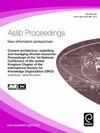Measuring the reliability of knowledge management: Instrument development and validation
引用次数: 11
Abstract
Purpose – As a way of assessing the ability of organizations to discover and manage unexpected failures in organizational capabilities of knowledge management (KM), this study aims to develop a measurement instrument that involves the five reliability dimensions of preoccupation with failure, reluctance to simplify interpretations, sensitivity to operations, commitment to resilience, and deference to expertise. Design/methodology/approach – To generate measurement items, previous research related to organizational reliability, high reliability theory, mindfulness, and required organizational capabilities of KM was reviewed. The measurement instrument was then verified in terms of reliability and validity, empirically using data from 240 companies in North America. Internal consistency of measurements, measurement item reliability, and construct reliability were examined to ensure the reliability of the instrument. Based on confirmatory factor analysis using structural equation modelling, construct validit...测量知识管理的可靠性:工具开发与验证
目的-作为评估组织发现和管理组织知识管理(KM)能力中意外故障的能力的一种方法,本研究旨在开发一种测量工具,该工具涉及对故障的关注、不愿简化解释、对操作的敏感性、对弹性的承诺和对专业知识的尊重这五个可靠性维度。设计/方法论/方法-为了生成测量项目,回顾了以往有关组织可靠性、高可靠性理论、正念和知识管理所需的组织能力的研究。然后,利用北美240家公司的数据,对测量工具进行了信度和效度的验证。对测量的内部一致性、测量项目的信度和结构的信度进行了检验,以保证仪器的可靠性。在验证性因子分析的基础上,运用结构方程模型构建验证性因子分析。
本文章由计算机程序翻译,如有差异,请以英文原文为准。
求助全文
约1分钟内获得全文
求助全文

 求助内容:
求助内容: 应助结果提醒方式:
应助结果提醒方式:


